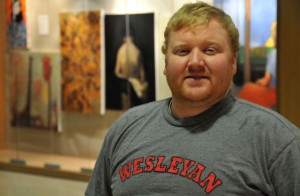Wesleyan Participates in Earth Day Commuter Challenge
Between now and Earth Day in April, Wesleyan employees who seek greener ways to commute to campus will have the opportunity to earn rewards through the Earth Day Commuter Challenge 2010: “Race to the Finish.” The event encourages all forms of green commuting including carpooling, vanpooling, telecommuting, biking, walking and taking the bus, and is projected to eliminating more than 140,000 vehicle trips state-wide. This level of participation would result in 5,000,000 fewer miles of driving and the elimination of 2,000 tons of emissions.
“Our hope is that the Earth Day Commuter Challenge will encourage employees to get out of their single occupancy cars and use alternate green modes of transportation,” explains Cliff Ashton, director of Physical Plant. “It’s the right thing to do for the environment and hopefully it will save employees money at the same time.”
The event is endorsed by Governor M. Jodi Rell and culminates with a reception at the State Capitol for the employers who have successfully encouraged their employees to participate.
According to the U.S. Department of Transportation, Americans take 1.1 billion trips a day. Of these trips, 78 percent are single-occupant trips, which clog roadways and account for about 50 percent of urban air pollution.
Several Wesleyan faculty and staff already make green choices in their to-and-from-work commute.

Josh Hamilton, Usdan University Center evening manager, commutes to work using custom fuel. He mixes regular diesel with filtered vegetable oil, and uses a higher concentration of oil during the warmer months. Ultimately, he’d like run the truck on 100 percent vegetable oil, but the outfit runs about $4,000.
“For now I am mixing, which is a help to the environment,” Hamilton says. “Economically I save some money, but I spend much more time fueling my truck up than most people who simply fill up at the station. I have to make trips to pick up dirty oil to bring to my friend in exchange for receiving the clean, doing math and recording percentages for mixing, plus building and maintaining storage tanks for vegetable fuel in my garage. I think it’s worth it, but it certainly is more work.”
Brandi Cahill, assistant director of University Events and Scheduling walks to work every day from her home near campus.
“I believe that the choices we make every day can positively impact climate change,” says Cahill.
Kate TenEyck, art studio technician, lives two miles away from her office and uses the 32 degree mark as the tipping point for whether she bikes to work or not. Via bike, her commute takes 15 minutes, only seven minutes longer than if she drove, parked and walked to the office.
“It seems so strange to me to be using thousands of pounds of steel (i.e. a car) to move a body that only weighs 150 pounds,” TenEyck says. “So much more energy is required to move the vehicle than is needed to move the body/bodies inside. I think bicycles are a totally brilliant design in that for a minimum amount of energy you can propel your body at a good pace.”
Several other Wesleyan employees opt to walk or ride a bike to campus, including Stephen Devoto, associate professor of neuroscience and behavior, associate professor of biology; Shawn Hill, desktop support specialist, Yonatan Malin, assistant professor of music; Brian Stewart, associate professor of physics; Don Oliver, the Daniel Ayres Professor of Biology; Michael McAlear, chair and associate professor of molecular biology and biochemistry; David Low, associate director of publications; Olivia Drake, newsletter editor; Trevor West, library assistant in acquisitions; Brian Nangle, area coordinator; Fred Ellis, professor of physics; Dana Royer, assistant professor of earth and environmental sciences; Magda Teter, associate professor of history, medieval studies, and feminist, gender and sexuality studies; Susan Cohen, University Events and Scheduling assistant; Tim Shiner, director of student activities and leadership development; and John Elmore, art director.
“On most days I bike to work and, when the roads are icy, I walk,” says Elmore, who lives about a mile from his Center for the Arts office. “I vary my routes—sometimes travelling downtown and sometimes across campus. There is much to see on either route and the commute gives me chance to be outside a bit at the start and end of my work day. Of course there are the additional benefits of saving money on gas and leaving a little less carbon behind me.”
The Earth Day challenge is sponsored by NuRide, a free service that rewards members for taking greener trips and reducing global warming, traffic congestion and energy consumption. Wesleyan employees can sign up for an account here and record their daily record of green commuting. For their efforts, employees will receive points that can be redeemed for gifts.
“NuRide isn’t your traditional carpool,” NuRide spokesperson Lisa Sattler-Biesak You can carpool whenever you want, share a ride one day or every day. It’s very flexible.”
The NuRide site allows registered users to connect to other employees traveling to or from Wesleyan. This process makes finding carpools even easier.
Commuters who participate in the event are eligible to earn rewards from local and national sponsors including over a dozen grand prizes of $100 in groceries from Peapod by Stop & Shop.

